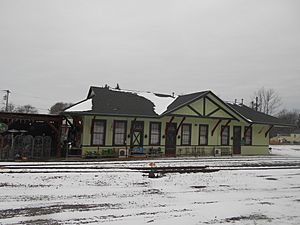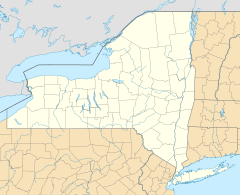Avon (village), New York facts for kids
Quick facts for kids
Avon, New York
|
|
|---|---|

The former Erie Railroad depot in Avon, now a restaurant
|
|
| Country | United States |
| State | New York |
| County | Livingston |
| Town | Avon |
| Government | |
| • Type | Village Hall |
| Area | |
| • Total | 3.15 sq mi (8.15 km2) |
| • Land | 3.15 sq mi (8.15 km2) |
| • Water | 0.00 sq mi (0.00 km2) |
| Elevation | 650 ft (198 m) |
| Population
(2020)
|
|
| • Total | 3,399 |
| • Density | 1,080.42/sq mi (417.11/km2) |
| Time zone | UTC-5 (Eastern (EST)) |
| • Summer (DST) | UTC-4 (EDT) |
| ZIP code |
14414
|
| Area code(s) | 585 |
| FIPS code | 36-03353 |
| GNIS feature ID | 0942736 |
Avon is a small village located in Livingston County, New York. It is part of the larger town of Avon. In 2020, about 3,399 people lived here. Both the village and the town are named after the River Avon in England.
Contents
Exploring Avon's Past
Avon was first settled by European Americans near the Genesee River. This area was once home to the Seneca, a Native American group. They had a village called Conawagus on the east side of the river. The Seneca people had lived in this region for hundreds of years.
Early Days and Important Leaders
The Seneca village of Conawagus was very important. A famous Seneca religious leader named Handsome Lake was born there around 1735. Another important person, Governor Blacksnake, also lived there. He was a war chief who later wrote down his life story. Cornplanter, another Seneca leader, was also born in this village around 1750.
How Avon Was Founded
European-American settlers started arriving in larger numbers around 1785. Many came from New England and eastern New York. In 1789, they officially formed the town and called it "Hartford." Later, in 1808, they changed the name to "Avon."
Avon as a Spa Town
In the early 1800s, Avon became famous as a spa and resort. People came to visit its natural mineral springs, which were thought to have healing powers. The village officially became a village in 1858.
Railroads and Racing
The Avon train station opened in 1865. Trains became a major way to travel and move goods across the state. Avon was also well-known for harness racing at the Avon Driving Park in the late 1800s and early 1900s.
Historic Buildings in Avon
Several buildings in Avon are listed on the National Register of Historic Places. These include the Aaron Barber Memorial Building, the Avon Inn, the First Methodist Episcopal Church of Avon, Hall's Opera Block, and the J. Francis Kellogg House. These places show Avon's rich history.
Where is Avon?
Avon is located at 42°54′37″N 77°44′51″W / 42.91028°N 77.74750°W. It covers about 3.15 square miles (8.1 square kilometers) of land. The Genesee River forms the western edge of the village. Avon is in the northern part of Livingston County, close to Monroe County.
Roads and Nearby Cities
Major roads like U.S. Route 20, New York State Route 5, and New York State Route 39 pass through Avon. Interstate 390 is just two miles to the east.
Avon is about 20 miles north of Rochester. Canandaigua is 24 miles to the east. Geneseo, the county seat, is 9 miles south. Batavia is 24 miles to the northwest.
People of Avon
| Historical population | |||
|---|---|---|---|
| Census | Pop. | %± | |
| 1840 | 600 | — | |
| 1850 | 500 | −16.7% | |
| 1860 | 879 | 75.8% | |
| 1870 | 900 | 2.4% | |
| 1880 | 1,617 | 79.7% | |
| 1890 | 1,653 | 2.2% | |
| 1900 | 1,601 | −3.1% | |
| 1910 | 2,053 | 28.2% | |
| 1920 | 2,585 | 25.9% | |
| 1930 | 2,403 | −7.0% | |
| 1940 | 2,339 | −2.7% | |
| 1950 | 2,412 | 3.1% | |
| 1960 | 2,772 | 14.9% | |
| 1970 | 3,260 | 17.6% | |
| 1980 | 3,006 | −7.8% | |
| 1990 | 2,995 | −0.4% | |
| 2000 | 2,977 | −0.6% | |
| 2010 | 3,394 | 14.0% | |
| 2020 | 3,399 | 0.1% | |
| U.S. Decennial Census | |||
In 2000, about 2,977 people lived in Avon. There were 1,151 households. Most people were White (95.70%). Other groups included Black or African American (1.85%), Native American (0.24%), and Asian (0.81%).
About 34.1% of households had children under 18. The average household had 2.54 people. The median age in the village was 37 years old.
The median income for a household was $40,109. For families, it was $53,105. About 7.5% of the population lived below the poverty line.
See also
 In Spanish: Avon (villa) para niños
In Spanish: Avon (villa) para niños



